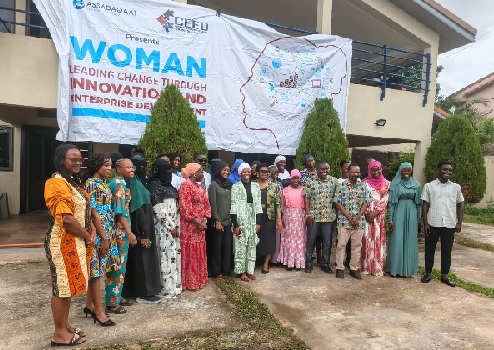Ghanaian women have been urged to embrace digital innovation as a critical tool for scaling their businesses and remaining competitive in today’s fast-evolving global economy.
Founder and Managing Director of the Centre for Entrepreneurship and Evaluation Development (CEED), Mrs Gifty Volimkarime, who made the call described digitalisation as a necessity rather than a luxury in modern business.
She was speaking during a graduation ceremony in Accra, where 75 women entrepreneurs completed a digital literacy and entrepreneurship training programme under the theme: “Empowering Women Entrepreneurs: Bridging the Digital Divide for Sustainable Business Growth.”
She stressed the importance of adopting emerging technologies to break barriers and access wider markets.
“Women must begin to innovate and align with modern digital trends. The world is changing rapidly, and businesses that fail to evolve will be left behind,” she said.
Mrs Volimkarime encouraged female entrepreneurs to leverage digital marketing, e-commerce platforms, and social media tools to build their brands and expand their customer base beyond local borders.
While acknowledging the challenges associated with digital adoption—particularly for women with limited access to technology or training—she urged participants not to be deterred.
“Growth often comes with discomfort. If you want to transform your business, you must be willing to take up the challenges,” she added.


The initiative, spearheaded by CEED in partnership with Hazakat Community Finance based in UK and funded by the Welsh Government, targeted women and youth from underserved communities. The training covered digital skills, financial literacy, entrepreneurship, and online marketing strategies.
Mrs Volimkarime revealed that over 900 women initially registered for the programme. However, logistical challenges—including incompatible devices and conflicting schedules—reduced the final cohort to 75. Despite the drop-off, organisers hailed the programme a success for introducing participants to tools such as artificial intelligence and digital branding.
Highlighting the gendered digital divide in Ghana, she noted that only 60% of women own smartphones, compared to 72% of men. “This inequality affects how women access opportunities online. Bridging this gap is essential for inclusive economic growth,” she said.

Media and Digital Strategist Emelia Enyonam Kuleke also addressed the graduates. She challenged them to step out of their comfort zones, explore new business models, and adopt strategies that reflect the realities of the digital age.
“The global marketplace is no longer confined to borders. If you’re visible online, you can sell in Accra, Nairobi, or London,” she said.
Ms Kuleke urged participants to prioritise customer engagement tools, online branding, and search engine optimisation to remain competitive. She also called for stronger collaboration between government, the private sector, and development organisations to support digital inclusion.
“Empowering women digitally is more than a social initiative—it is an economic imperative for Ghana’s future,” she said
